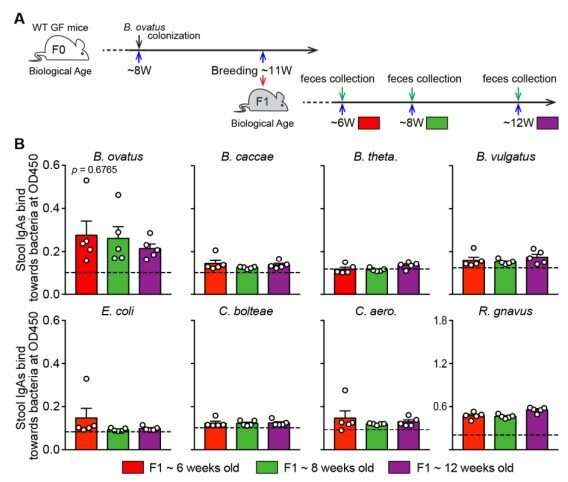July 11, 2022 report
IgA antibodies bind to specific species of gut bacteria in mice

A team of researchers with the Icahn School of Medicine at Mount Sinai reports that immunoglobulin A (IgA) antibodies bind to specific species of related gut bacteria in mice. They published their results in Science Immunology.
Prior research has shown that mammals including humans and mice make IgA antibodies, which happen to be the most common type, and IgA antibodies bind to gut bacteria to keep them from transporting to other parts of the body where they could cause problems. However, it was unclear whether the IgA antibodies target bacteria in the gut in a generic way, or if they are able to target specific bacteria.
To learn more about how IgA antibodies do their work, the researchers sterilized the guts of several test mice and then introduced eight species of bacteria. The team waited three weeks then collected stool samples from the test mice and studied them to determine how well IgA antibodies were binding to the bacteria.
They found that the IgAs were bound to a single bacterial species, with just a few examples of crossover to bacteria of the same genus. They noted that some were even specific to a single strain of bacteria. These findings suggested that the immune system was producing custom IgA antibodies for the bacteria present.
To confirm their findings, the researchers next introduced the same eight bacterial species into sterile mouse guts. After three weeks, they allowed the mouse B cells to produce hybridomas, in which B cells were combined with myeloma. The researchers found that the hybridomas produced 21 unique IgAs and that all but two had targeted a single bacterial species. They also found that two of them had bound to all eight of the bacterial species. And they found that they could feed the mice hybridoma-produced antibodies that would survive the trip through the stomach and intestines, suggesting similar therapies could be used to assist human patients with gut troubles.
Interestingly, the work by the team in this new effort contrasts with results found by another team in 2017—they found antibodies produced by cells in the intestines are recirculated independently of antigen and T cells and that the IgAs that are released as a result bind with surface glycans, which recognize gut microbiota.
More information: Chao Yang et al, Immunoglobulin A antibody composition is sculpted to bind the self gut microbiome, Science Immunology (2022). DOI: 10.1126/sciimmunol.abg3208
© 2022 Science X Network



















